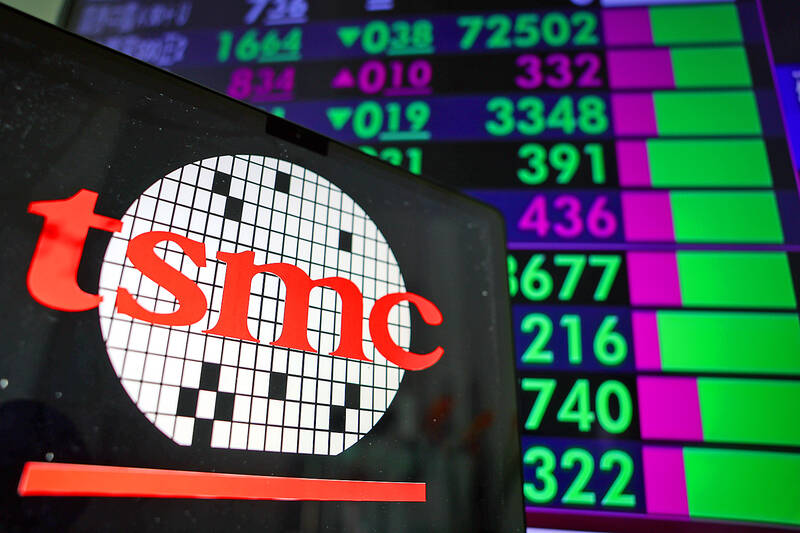Taiwan Semiconductor Manufacturing Co (TSMC, 台積電) suspended shipments to China-based chip designer Sophgo Technologies Ltd (算能科技) after a chip it made was found on a Huawei Technologies Co (華為) artificial intelligence (AI) processor, according to two people familiar with the matter.
Sophgo had ordered chips from TSMC that matched the one found on Huawei’s Ascend 910B, the people said. Huawei is restricted from buying the technology to protect US national security. Reuters could not determine how the chip ended up on the Huawei product.
Sophgo said in a statement on its Web site yesterday that it was in compliance with all laws and had never engaged in any business relationship with Huawei. Sophgo, which is affiliated with cryptocurrency mining equipment company Bitmain Technologies Ltd (比特大陸), said it had provided a detailed investigation report to TSMC to prove that it was not related to Huawei.

Photo: CNA
TSMC declined to comment. Huawei did not immediately respond to a request for comment. The US Department of Commerce said it was aware of reports of potential violations of US export controls but it could not comment on whether any investigation was ongoing.
Tech research firm TechInsights discovered the TSMC chip on Huawei’s Ascend 910B when it took apart the multi-chip processor, a different source told Reuters on Tuesday last week.
After being alerted to the finding, TSMC notified the US about two weeks ago, the source said.
About the same time, TSMC also halted shipments to a client, Reuters reported on Wednesday, citing a Taiwanese official who said the suspension came after the company discovered a chip it supplied to the client ended up in a Huawei product.
TSMC alerted Taiwanese and US authorities, and began a detailed investigation, the official said. However, the official did not name the client, which the latest sources identified as Sophgo. The Information tech news outlet also reported the name on Saturday.
In August, the Research Institute for Democracy, Society and Emergency Technology (DSET) in Taiwan reported that Bitmain, which it described as a leading Chinese integrated circuit design enterprise and supplier of cryptocurrency mining machines, was “aiming to challenge the AI chip market dominance of Nvidia Corp and Advanced Micro Devices Inc.”
The DSET report described Sophgo as a Bitmain affiliate. Sophgo was co-founded by Micree Zhan (詹克團), who also co-founded Bitmain, according to a corporate registration database.
The company also communicated with the US Federal Communications Commission last year using a Bitmain email address and the name Xiamen Sophgo Technologies Ltd.
In 2021, prosecutors raided Bitmain’s operations in Taiwan and accused two Bitmain affiliates of illegally recruiting Taiwanese semiconductor engineers and illegally conducting research and development activities, the New Taipei City Prosecutors’ Office said in a statement.
Four Taiwanese defendants pleaded guilty and were given fines, it said.
Sophgo’s Web site says it has research and development centers in more than 10 cities in China and other countries.

TAKING STOCK: A Taiwanese cookware firm in Vietnam urged customers to assess inventory or place orders early so shipments can reach the US while tariffs are paused Taiwanese businesses in Vietnam are exploring alternatives after the White House imposed a 46 percent import duty on Vietnamese goods, following US President Donald Trump’s announcement of “reciprocal” tariffs on the US’ trading partners. Lo Shih-liang (羅世良), chairman of Brico Industry Co (裕茂工業), a Taiwanese company that manufactures cast iron cookware and stove components in Vietnam, said that more than 40 percent of his business was tied to the US market, describing the constant US policy shifts as an emotional roller coaster. “I work during the day and stay up all night watching the news. I’ve been following US news until 3am

UNCERTAINTY: Innolux activated a stringent supply chain management mechanism, as it did during the COVID-19 pandemic, to ensure optimal inventory levels for customers Flat-panel display makers AUO Corp (友達) and Innolux Corp (群創) yesterday said that about 12 to 20 percent of their display business is at risk of potential US tariffs and that they would relocate production or shipment destinations to mitigate the levies’ effects. US tariffs would have a direct impact of US$200 million on AUO’s revenue, company chairman Paul Peng (彭雙浪) told reporters on the sidelines of the Touch Taiwan trade show in Taipei yesterday. That would make up about 12 percent of the company’s overall revenue. To cope with the tariff uncertainty, AUO plans to allocate its production to manufacturing facilities in

Six years ago, LVMH’s billionaire CEO Bernard Arnault and US President Donald Trump cut the blue ribbon on a factory in rural Texas that would make designer handbags for Louis Vuitton, one of the world’s best-known luxury brands. However, since the high-profile opening, the factory has faced a host of problems limiting production, 11 former Louis Vuitton employees said. The site has consistently ranked among the worst-performing for Louis Vuitton globally, “significantly” underperforming other facilities, said three former Louis Vuitton workers and a senior industry source, who cited internal rankings shared with staff. The plant’s problems — which have not

COLLABORATION: Given Taiwan’s key position in global supply chains, the US firm is discussing strategies with local partners and clients to deal with global uncertainties Advanced Micro Devices Inc (AMD) yesterday said it is meeting with local ecosystem partners, including Taiwan Semiconductor Manufacturing Co (TSMC, 台積電), to discuss strategies, including long-term manufacturing, to navigate uncertainties such as US tariffs, as Taiwan occupies an important position in global supply chains. AMD chief executive officer Lisa Su (蘇姿丰) told reporters that Taiwan is an important part of the chip designer’s ecosystem and she is discussing with partners and customers in Taiwan to forge strong collaborations on different areas during this critical period. AMD has just become the first artificial-intelligence (AI) server chip customer of TSMC to utilize its advanced